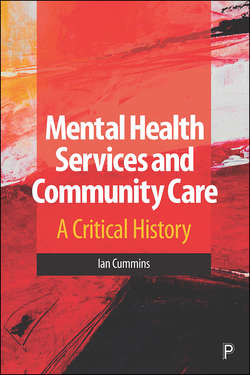Mental Health Services and Community Care

Реклама. ООО «ЛитРес», ИНН: 7719571260.
Оглавление
Cummins Ian. Mental Health Services and Community Care
Отрывок из книги
MENTAL HEALTH SERVICES AND COMMUNITY CARE
A Critical History
.....
Alongside what we might term the moral defence of psychiatry – the notion that it is a branch of medicine that is concerned with the relief of suffering – we should also explore other challenges to Foucault. Scull (1991) is very critical of Foucault’s use of sources and the conclusions that he reaches arguing they are based on the analysis of a limited range of texts. In addition, Scull (1991) argues that Foucault has used a very specific period in French history to represent the totality of European developments in this field. Sedgwick (1982) has demonstrated that the link Foucault makes between the decline in the treatment of leprosy and the development of psychiatric asylums does not hold. For Foucault, prior to the ‘Great Confinement’ the mad had essentially been tolerated and allowed to live in society. Sedgwick argues that this portrayal of the mad as the lepers of modern society ignores the fact that the mad had been held in various forms of custody prior to the period Foucault is discussing. In representing asylums as a response to urbanisation, Foucault cannot account for their development in the US at a time when it was an agrarian society (Rothman, 2002). One response to this is to argue that Foucault is not making any such claims. His work is historically specific and seeks to analyse the various factors at play – at that time, in that place. This is counter to an approach that is based on or creates a metanarrative of the rise of the asylums.
For other critics, such as Rothman (2002), Foucault has, in effect, reduced the complex causes of the development of asylums to a class strategy of ‘divide and rule’. One impact of this is to simplify the complexity of the founding and management of the asylum regime. For example, it overlooks or does not accept the religious motivations of many founders – Tuke at York being a prime example. Anti-psychiatry chimed with some of the anti-authoritarian developments in the wider culture of the 1960s. This helps to explain the largely positive reception that it received. However, it is also part of its weakness. Scull (2014) demonstrates that all societies grapple with the moral and ethical questions that are generated by societal responses to mental illness. The response clearly involves social control, but we also need to see it as something more than that. There are many aspects to it because mental illness is such a diverse and complex phenomenon. Finally, the focus in Foucault’s account is on essentially state responses. This overlooks the other ways that families, wider social attitudes and public sanctions – formal and otherwise –combine to produce social order (Ignatieff, 1985).
.....